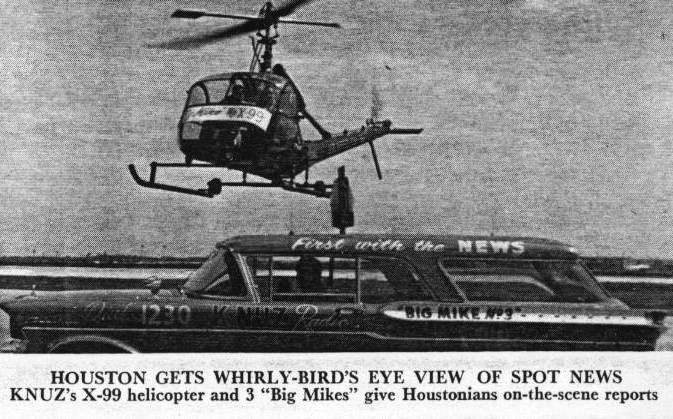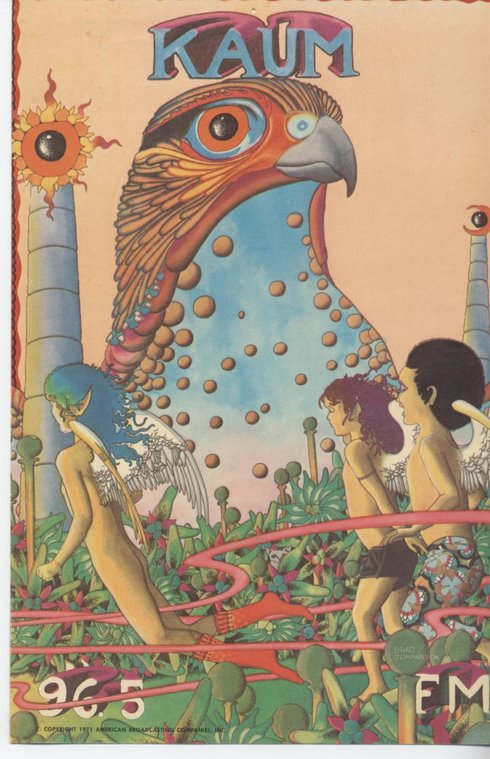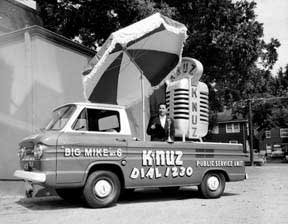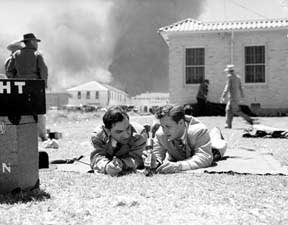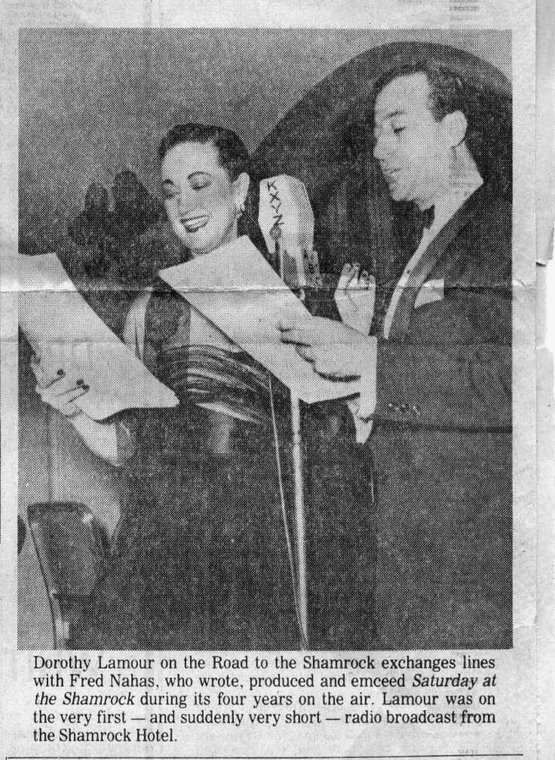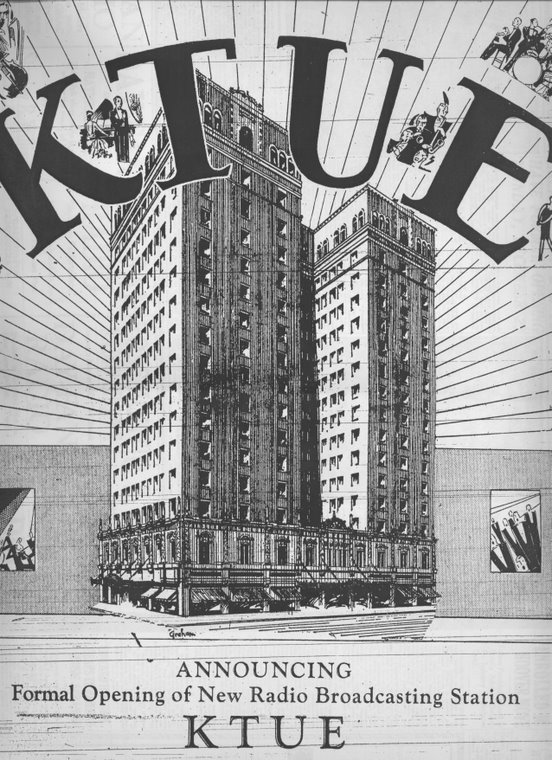The 1950s - Part I - KLVL, KMCO, KLBS, KBRZ, KCOH, KYOK
EDITED (BELOW) 9/8/2023
As mentioned previously, KLVL signed on May 5, 1950, at 1480 kc, licensed to Pasadena. (Posts including mentions).
On April 16, 1951, KMCO signed on in Conroe at 900 kc. In 1979, the call letters of the Conroe station were KIKR; presently, KREH, licensed to Pecan Grove and a Vietnamese language station known as Radio Saigon, operates on the 900 frequency.
After the death of W. Albert Lee in November, 1951, Trinity Broadcasting Corporation purchased KLEE from his estate for $300,000. Trinity was made up of B.R. and Gordon McLendon of Dallas and oilman Hugh Roy Cullen of Houston. They owned KLIF, Dallas, KELP, El Paso, and the Liberty Broadcasting System. The station’s new calls were to be KLBS and the change took place on April 25, 1952, probably at midnight since both stations operated 24 hours a day. Ray A. Lewis was general manager of Trinity; Tom Cavanaugh was to be the General Manager of KLBS.
Gordon McLendon also said plans were being made to move the Liberty network’s headquarters to Houston from Dallas by sometime early in 1953 with about 150 jobs accompanying the move. KLBS would be the key station of the Liberty Broadcasting System and there would be a 100% change in the programming of the station. “Our goal is to salute Houston daily with top local and national entertainment, public interest and sports features,’ McLendon told the Houston Chronicle. The proposed move never took place as the network fell apart. McLendon was to sell KLBS in less than 2 years, only to repurchase it in 1957 and flip the call letters to KILT.
The Liberty network’s re-creations of baseball games had been a huge success and are what the network is mostly remembered for but there was a full range of programming offered including soap operas and newscasts originating from Washington, D.C., with such noted journalists of the day as William L. Shirer, Raymond Gram Swing, Joseph C. Harsh and John C. Vandercook. By the end of 1950, Liberty was supplying programming 16 hours a day and by August, 1951, had 431 affiliates, second only to the Mutual Broadcasting System. In Houston, LBS programs were heard on KATL. Less than a year later, 100 of the affiliates had pulled their affiliations, the broadcast day had been cut to 8 hours and the network was unraveling. Finanical problems were at the fore, with the loss of a $1,000,000 advertising contract with Falstaff beer the biggest single blow. This is what had led Hugh Roy Cullen to buy a stake in the network. Cullen, probably the richest Texan of the period, was impressed with McLendon and put $1,000,000 into the company without ever looking at the books. The network continued to lose money, however, and a second major blow was the refusal of Western Union to provide the wire service accounts that were necessary to the re-creation of ball games, a refusal that was upheld by a Federal judge in Chicago on April 14, 1952, one day before the start of the ‘52 baseball season.
For a first hand account of a McLendon sports recreation, see Don Keyes' account of working with McLendon, posted online a few years ago. Keyes was to be the National Program Director of the McLendon station group in later years, after the demise of LBS, and did mornings on KILT in Houston in the late 50s, being most famous for a flag-pole sitting stunt at Gulfgate Mall in 1957 (story here).
For a history of Gordon McLendon and his Liberty Broadcasting System and his ‘home’ station KLIF, see this excellent, comprehensive site maintained by Steve Eberhart. Also see the biography Gordon McLendon: The Maverick of Radio by Ronald Garay.
KBRZ, Freeport, came on the air at 1460 kc at the end of August, 1952. A detailed account of the sign-on and early years of the station has been posted here.

The first week of August, 1953, a group of investors headed by Robert C. Meeker acquired the license to KCOH and announced plans to change the programming over to serve Houston’s Black community. The office, technical and sales staff were to be retained but an all new air staff would be brought in. Vernon Chambers, who for three straight years had been voted one of the nation’s best Black disk jockeys, was named program director. Walter Rubens was the commercial manager. KCOH was the first Black-owned radio station in Texas according to the Handbook of Texas and only the second programmed for a Black audience in the state.
The official switch over of programming was supposed to be on August 21, 1953, but a look at the daily listings indicates the changes may have been made gradually or the station might have already been programming some toward the Black audience before the change of ownership. Programs included Harlem Breakfast and Harlem Nights, Tuxedo Junction and Cool and Easy. It is, of course, impossible to know what the musical content of those programs was just from the names. On the 21st, the newspaper schedule showed Chambers Corner, King Bee and Hattie Holmes, Sweet and Solid, Jammin’ Jamboree, Swing Low, the Rhythm Parade and the PM Ramble on the schedule.
A similar switch seemed to be taking place on KATL in the same time period. Program listings included Dixie Downbeat, RFD 1590, and the Chuck Wagon Call that had been the station’s morning show for years, but also Trummie Cain and Ramblin’ Round, both of which were later seen on KCOH schedules. In early 1954 King Robinson, General Manager and part-owner, announced that he and William H. ‘Little Eva’ Talbot, majority owner, had received an inquiry from a couple of Louisiana businessmen interested in buying the station. An announcement was expected soon and it came on the 15th of January. Jules Paglin and Stanley Ray, who owned stations in New Orleans, Baton Rouge and Lake Charles, bought KATL for $200,000. Their group was known as the ‘OK’ chain and they were considering KYOK as new calls on 1590. No changes in programming were planned, it was stated.
KYOK was to become Houston’s second Black radio station; program changes apparently were brought into place gradually. Like most stations, KATL/KYOK was block programmed. Paglin and Ray eventually were to own a chain of black radio stations, including WBOK, New Orleans, WGOK, Mobile, WLOK, Memphis and WXOK, Baton Rouge. The new calls first appeared in the listings in the Chronicle on March 10 but not until March 18 in the Post.
In the summer of 1954 KYOK program listings still included Chuck Wagon Call, Let’s Polka, Gabe Tucker, Serenade in Blue, Kosher Kitchen and Hillbilly Hits, along with Sweet Chariot, Hotsy Totsy, Spiritual Sunbeams, and Little Betty. Hotsy-Totsy was to be a name of a KYOK jock for years. Tucker, a country dj, had worked on KATL, KLEE, and was to be on KRCT and KIKK for years.

Other stations, including KREL, also played rhythm and blues but KCOH took note of the new competition running ads touting itself as ‘Houston’s First and Only Negro Radio Station.’ The line-up on 1430 by this time included Chamber’s Corners, King Bee, Hattie Holmes, the Great Montague and Ramblin’ Around. A real estate program had been added on Sunday afternoons, patterned after a successful show on KXYZ, presented by a Black realtors association and aimed at Black homebuyers. It has also joined a new network, the 45 station strong National Negro Network, and started airing the first network program, a soap opera called Ruby Valentine, daily at 11am. There were plans for 3 more soaps and a dramatic series; network programs were distributed on tape.
EDIT TO ADD: King Bee, on KCOH, real name was Clifton Smith. He had an airshift on KNUZ in 1950 and is pictured in the montage at the top of the blog. He (and Gladys 'GiGi' Hill were nominated for the Texas Radio Hall of Fame this year (2023) but did not receive enough votes to get in.


